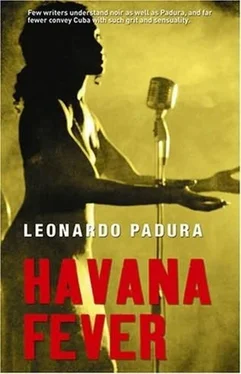Leonardo Padura - Havana Fever
Здесь есть возможность читать онлайн «Leonardo Padura - Havana Fever» весь текст электронной книги совершенно бесплатно (целиком полную версию без сокращений). В некоторых случаях можно слушать аудио, скачать через торрент в формате fb2 и присутствует краткое содержание. Жанр: Триллер, на английском языке. Описание произведения, (предисловие) а так же отзывы посетителей доступны на портале библиотеки ЛибКат.
- Название:Havana Fever
- Автор:
- Жанр:
- Год:неизвестен
- ISBN:нет данных
- Рейтинг книги:3 / 5. Голосов: 1
-
Избранное:Добавить в избранное
- Отзывы:
-
Ваша оценка:
- 60
- 1
- 2
- 3
- 4
- 5
Havana Fever: краткое содержание, описание и аннотация
Предлагаем к чтению аннотацию, описание, краткое содержание или предисловие (зависит от того, что написал сам автор книги «Havana Fever»). Если вы не нашли необходимую информацию о книге — напишите в комментариях, мы постараемся отыскать её.
Havana Fever — читать онлайн бесплатно полную книгу (весь текст) целиком
Ниже представлен текст книги, разбитый по страницам. Система сохранения места последней прочитанной страницы, позволяет с удобством читать онлайн бесплатно книгу «Havana Fever», без необходимости каждый раз заново искать на чём Вы остановились. Поставьте закладку, и сможете в любой момент перейти на страницу, на которой закончили чтение.
Интервал:
Закладка:

Leonardo Padura
Havana Fever
The fifth book in the Mario Conde Mystery series, 2009
First published in Spanish as La neblina del ayer by Tusquets Editores, S.A.,Barcelona, 2005
© Leonardo Padura, 2005 English translation © Peter Bush, 2009
Once more and quite rightly:
for Lucía, with love and…
HAVANA, SUMMER 2003
There is only one vital time to wake up:
and that is now.
Buddha
The future is God’s, but the past belongs to history. God can’t have any more influence on history, but man can still write and transfigure it.
Just Dion
The A side: Be gone from me
…In your life I’ll be the best from the mists of yesterday when you’ve forgotten me, like the best poem’s always the one we can’t remember.
Virgilio y Homero Expósito,
Be gone from me
The symptoms hit him suddenly, like a voracious wave sweeping a child off a quiet shore and dragging him into the depths of the sea: a lethal double blow to the stomach, numbness that turned his legs to jelly, a cold sweat on his palms and, above all, the searing pain, under his left nipple, which accompanied every single hunch he’d ever had.
As soon as the doors to the library slid open, the smell of old paper and hallowed places floating in that mind-blowing room overwhelmed him. In his far-off years as a police detective, Mario Conde had learnt to recognize the physical signs of his situationsaving hunches: he must have been wondering if he’d ever experienced such a powerful flood of sensations.
Initially he was all set to be ruthlessly logical, and tried to persuade himself that it was pure chance he’d come across that shadowy, decaying mansion in El Vedado: an unusual stroke of good fortune for once had deigned to come his way. But a few days later, when corpses old and new stirred in their graves, the Count began to think that no margin for coincidence existed, that it had all been dramatically prepared, like a stage set up for a performance that only his disruptive entrance could trigger.
Ever since he’d left his job as a criminal investigator, more than thirteen years ago, and devoted himself body and soul – at least as much as his battered body and increasingly enfeebled soul allowed – to the dicey business of buying and selling books, the Count had developed an almost canine ability to track down prey that would guarantee, sometimes in surprisingly generous quantities, his supply of food and alcohol. Whether for good or for evil – he couldn’t decide which – his departure from the police and forced entry into the world of commerce had coincided with the official declaration that Crisis had hit the island – a galloping Crisis that would soon dwarf all previous versions. The perennial, interminable periods of austerity the Count and his contemporaries had faced for decades now started to seem, in the course of inevitable comparisons and tricks of memory, like days of plenty or nameless mini-crises, with no right to awe-inspiring personification by capital letter.
As if the result of a malevolent wave of a wand, the shortage of everything imaginable quickly became a permanent state, attacking the most disparate of human needs. The value and nature of every object or service was artfully transmuted by insecurity into something different from what it used to be: be it a match or an aspirin, a pair of shoes or an avocado, sex, hopes or dreams. Meanwhile church confessionals and consultancies of voodoo priests, spiritualists, fortune-tellers, mediums and babalaos were crowded with new adepts, panting after a breath of spiritual consolation.
The shortages were so acute they even hit the venerable world of books. Within a year publishing went into freefall, and cobwebs covered the shelves in gloomy bookshops where sales assistants had stolen the last light bulbs with any life, that were next-to useless anyway, in those days of endless blackouts. Hundreds of private libraries ceased to be a source of enlightenment and bibliophilic pride, or a cornucopia of memories of possibly happy times, and swapped the scent of wisdom for the vulgar, acrid stench of a few life-saving banknotes. Priceless libraries created over generations and libraries knocked together by upstarts; libraries specializing in the most profound, unusual themes and libraries made from birthday presents and wedding anniversaries – were all cruelly sacrificed by their owners on the pagan altar of financial necessity suddenly felt by the inhabitants of a country where the shadow of death by starvation threatened almost every home.
That desperate act of offering a few, genuinely or would-be valuable volumes, or putting on sale boxes, yards, shelves, even entire collections assembled over one or more lifetimes, raised conflicting hopes in the dreams of buyers and sellers. The former always claimed they were offering bibliographical jewels and were eager to hear figures that might assuage the guilt the majority suffered when they off-loaded their closest travelling companions on the voyage through life. The latter revived a mercantile spirit they’d thought banned from their island, and tried to make a purchase they could later transform into a killing by arguing that the volumes in question had scant value or commercial potential.
In his early days in this new profession, Mario Conde had tried to turn a deaf ear to the stories behind the libraries that fell into his hands. His years as a detective had forced him to live surrounded by sordid files, but this hadn’t made him immune to the sorrows of the soul and, when he got his way and left the police force, he discovered painfully that the dark side of life still pursued him. Every library for sale was a romantic novel with an unhappy ending, the drama of which didn’t depend on the quantity or quality of books being sacrificed, but on the paths along which the volumes had reached that particular house and the terrible logic now sending them to be slaughtered in the marketplace. Nevertheless, the Count quickly learnt that listening was an essential part of the business, because the majority of owners felt the need to discuss the reasons behind their decisions, sometimes dolling them up, sometimes stripping them bare, as if that act of confession at least salvaged a shred of their dignity.
Once the scars had healed, Conde began to see the romantic side of his role as a listener – he liked to describe himself as such – and started to weigh up the literary potential in those stories, often taking them on board as material for his ever deferred aesthetic endeavours. As he sharpened his insights, so he felt able to distinguish when a narrator was genuine or a pathetic liar, spinning a yarn in order to be better reconciled with his conscience, or merely to showcase his merchandise.
The more he penetrated the mysteries of his trade, the more Mario Conde realized he preferred the exercise of buying to the subsequent selling of the tomes he acquired. The act of selling books in a doorway, on a park bench, on the bend of a promising pavement, fanned smouldering remains of ravaged pride but above all provoked frustration at having to get rid of an item he’d often have preferred to retain. Consequently, although his earnings plunged, he adopted the strategy of working only as a trawler, replenishing the stocks of other street-sellers. From then on, when prospecting for mines of books, like all his colleagues in the city, the Count employed three complimentary, occasionally conflicting techniques: firstly, the most traditional: visiting someone who’d asked him to pay a call, as a result of his well-established reputation as a fair buyer; then, the embarrassing, almost medieval procedure of hawking – “I buy old books”, “I’m the man to take those old books off your hands”; or the most in-your-face, knocking optimistically on doors and asking whoever opened up if they were interested in selling a few well-worn books. The second of those commercial approaches was the most productive in outlying, perpetually impoverished districts that were generally quite unfruitful – though there was the occasional surprise – and where the art of buying and selling the impossible had for years been the survival system for hundreds of thousands of people. On the other hand, the “truffle” method of sniffing out houses was necessary in once aristocratic districts like El Vedado, Miramar and Kohly, and in parts of Santos Suárez, El Casino Deportivo and El Cerro, where people, in the teeth of the poverty spreading across the nation, struggled to preserve increasingly obsolete ways of life.
Читать дальшеИнтервал:
Закладка:
Похожие книги на «Havana Fever»
Представляем Вашему вниманию похожие книги на «Havana Fever» списком для выбора. Мы отобрали схожую по названию и смыслу литературу в надежде предоставить читателям больше вариантов отыскать новые, интересные, ещё непрочитанные произведения.
Обсуждение, отзывы о книге «Havana Fever» и просто собственные мнения читателей. Оставьте ваши комментарии, напишите, что Вы думаете о произведении, его смысле или главных героях. Укажите что конкретно понравилось, а что нет, и почему Вы так считаете.











